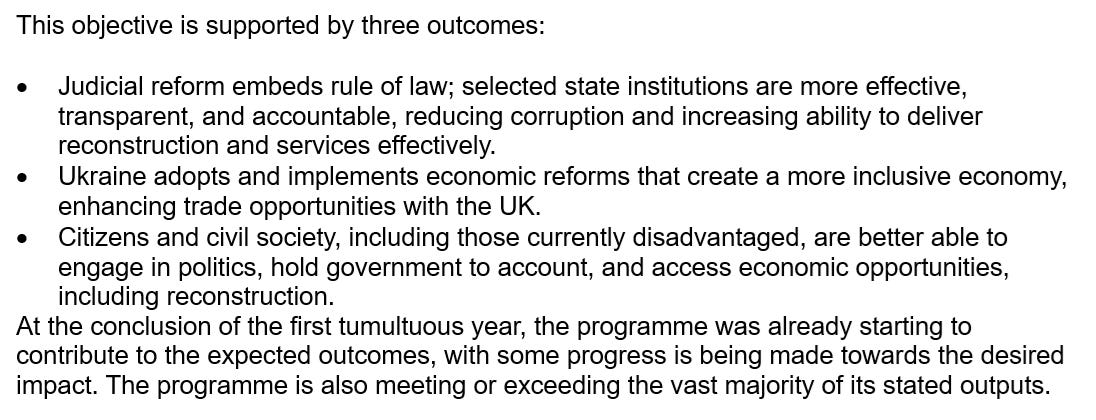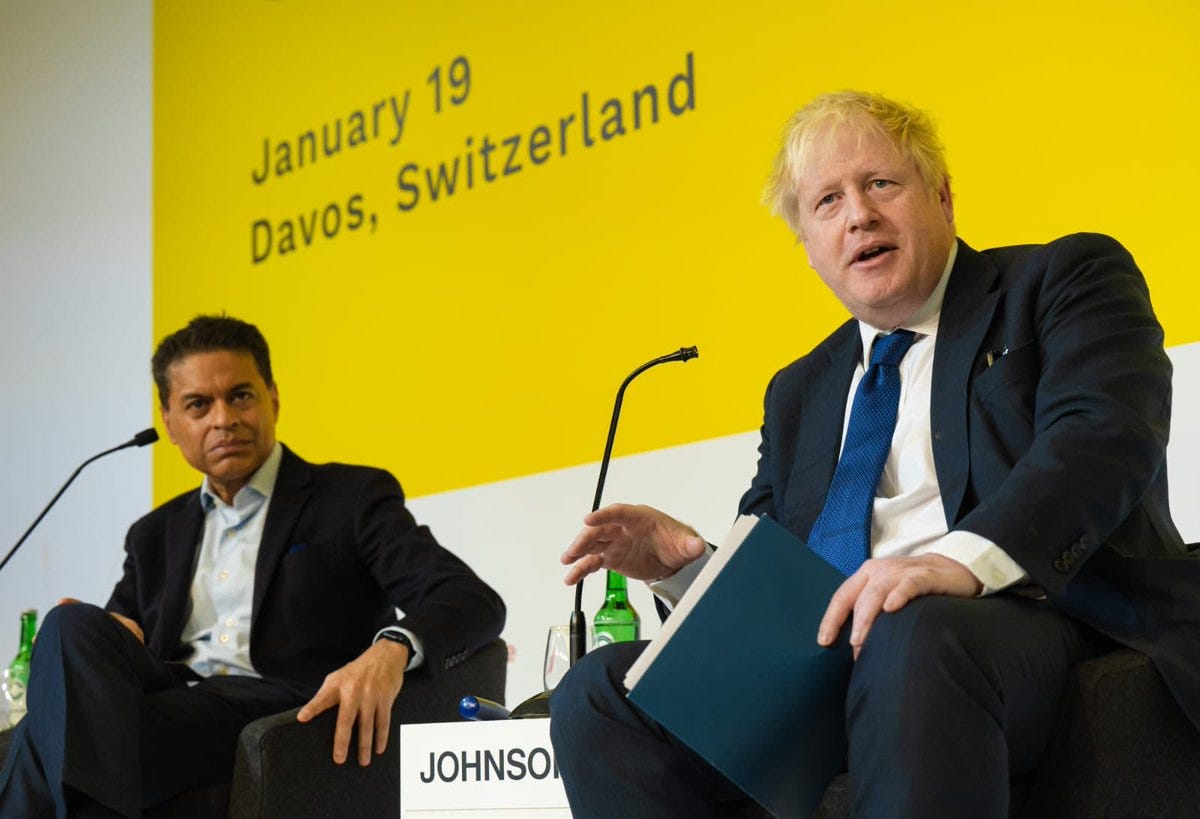Ukraine's Corporate Carve-Up Collapses?
All my investigations are free to read, thanks to the enormous generosity of my readers. Independent journalism nonetheless requires investment, so if you value this article or any others, please consider sharing, or even becoming a paid subscriber. Your support is always gratefully received, and will never be forgotten. To buy me a coffee or two, please click this link.
On July 5th, Bloomberg reported that a BlackRock-administered multibillion-dollar fund for Kiev’s reconstruction, due to be unveiled at a dedicated Ukraine Recovery Conference in Rome July 10th/11th, had been placed on hold at the start of 2025 “due to a lack of interest” among institutional, private, and state financiers. The summit is over, lack of investor enthusiasm persists, and “the project’s future is now uncertain.” It’s just the latest confirmation the West’s long-running mission to carve up Ukraine for profit verges on total disintegration.
BlackRock’s Ukraine Development Fund has been in the works since May 2023. It was originally envisaged as one of the most ambitious public-private finance collaborations in history, which would rival Washington’s Marshall Plan that rebuilt - and heavily indebted - Western Europe in World War II’s wake. With vast returns promised, initially investors were reportedly “ready to plow funds” into the endeavour, due to widespread optimism Kiev’s much-hyped “counteroffensive” later that year “might end the war quickly.”
In the event, the counteroffensive was an unmitigated disaster. Ukraine suffered up to 100,000 casualties, with much of its arsenal of Western-supplied armour, vehicles and weapons obliterated, in return for recapturing just 0.25% of the territory occupied by Russia in the proxy war’s initial phases. As BlackRock vice chair Philipp Hildebrand explained, the results killed off investor exuberance, as they required “the cessation of hostilities, or at the very least a perspective for peace.” Concerns about Ukraine’s ever-reducing skilled workforce were also widespread.
Fast forward to today, and there is no indication of any peace deal on the horizon, Russia is rapidly advancing across multiple fronts, and the Ukrainian government estimates the country has lost around 40% of its working-age population due to the proxy war. Little wonder BlackRock’s Development Fund has failed to attract a single dollar. Quite what will remain of Ukraine when the conflict is over, and whether any financial returns can be gleaned from its ruins, are open, grave questions.
The collapse of BlackRock’s Ukraine Development Fund is not only a microcosm of the impending, inevitable defeat of Kiev and its overseas puppetmasters in Donbass. It also reflects the death of the dream of breaking apart Ukraine’s industries and resources to untrammelled rape and pillage, long-held by Western corporations, oligarchs, and governments. Planning for this eventuality dates back to the country’s 1991 independence, producing concrete results following the 2014 Western-orchestrated Maidan coup, and becoming turbocharged once all-out proxy war erupted in February 2022.
‘Investment Climate’
From the start of 2013, Western corporations began moving en masse to buy up Ukraine wholesale. It was widely expected Kiev would that year enter into an “association agreement” with the EU, facilitating privatisation, and tearing up of longstanding laws restricting foreign purchase and ownership of the country’s untold agricultural riches. The former “breadbasket of the Soviet Union” is home to the equivalent of one third of the EU’s total arable land, and projected profits were voluminous.
That January, Anglo-Dutch MI6-linked energy giant Shell signed a 50-year deal with the Ukrainian government to explore and drill for natural gas via fracking in areas of Donetsk and Kharkov “believed to hold substantial natural gas.” Then, in May, notorious, now-defunct chemical giant Monsanto announced plans to invest $140 million in constructing a corn seed plant in the country’s agricultural heartlands. The company was a founding member of the US-Ukraine Business Council, established in October 1995 to “improve” Kiev’s “investment climate.”
USUBC’s treasurer was and remains David Kramer, who during Maidan also served as president of Freedom House, a National Endowment for Democracy division. NED was avowedly founded by the CIA to do publicly what the Agency historically did covertly. The Endowment and Freedom House were responsible for Ukraine’s 2004 “Orange Revolution”, which brought pro-Western puppet Viktor Yushchenko to power. He immediately implemented deeply unpopular neoliberal economic reforms, including slashing regulations and social spending. Yushchenko was voted out in 2010, securing just 5% of the vote.
Following Ukrainian President Viktor Yanukovych’s rejection of the EU association agreement in favour of a more advantageous deal offered by Russia in November 2013, the mass Maidan protests in Kiev were ignited by NED-affiliated actors, and fascist agitators. They raged until late February 2014, when Yanukovych fled the country. In the intervening time, Ukraine was plunged into total chaos - yet, firms associated with USUBC weren’t deterred. Many, including major companies with representatives on the organisation’s executive committee, continued making sizeable investments in Ukraine throughout.
Their undimmed enthusiasm may be explained by David Kramer being an alumni of Project for the New American Century, a neoconservative think tank widely credited with masterminding the Bush administration’s “War on Terror”. The organisation’s cofounder Robert Kagan is married to Victoria Nuland, at this time the State Department’s point person on Ukraine. She visited Kiev repeatedly during the Maidan “revolution”, and hand-picked Yanukovych’s replacement interim government. Nuland was thus well-placed to know USUBC member investments in Ukraine would be safe long-term.
‘Trade Opportunities’
Nuland’s fascist interim government was replaced in June 2014 by an administration led by far-right Petro Poroshenko, who stood on an explicit platform of privatising state industries. The President passed legislation enabling this in March 2016. Two years later, his government adopted sweeping laws to further facilitate the auctioning off of Kiev’s public assets and industry to foreign actors. However, a moratorium on private sale of arable land, imposed in 2001, remained in place. No matter - in August 2018, the European Court of Human Rights ruled this was illegal.
There was still one problem, though. Opinion polls consistently showed Ukrainian citizens overwhelmingly rejected privatisation, and the sale of their country’s agricultural land to overseas buyers. As luck would have it, the proxy war’s eruption, and imposition of martial law, allowed for industrial scale trampling by Volodomyr Zelensky’s government over public opinion, and political opposition. Throughout 2022, a series of controversial laws intended to “make privatization as easy as possible for foreign investors” were passed without hindrance.
In the process, close to 1,000 nationalised enterprises were offered up for overseas sale, and auctions for purchase of these entities “under simplified terms” convened. The next year, these efforts intensified, with further legislation enacted enabling “large-scale privatisation of state assets and state companies.” This was reportedly motivated by “the attractiveness” of Ukraine’s “large state assets to institutional investors.” They included an Odessa-based ammonia factory, major mining and chemical firms, one of the country’s leading power generators, and a producer of high-quality titanium products.
Encouraged by the West’s reception to these moves, in July 2024 Kiev announced a dedicated “Large-Scale Privatisation” plan, with yet more prize assets under the hammer. Two months later, a British Foreign Office briefing document openly acknowledged it viewed “the invasion not only as a crisis, but also as an opportunity.” London’s primary economic aid project in Ukraine is explicitly concerned with ensuring the country “adopts and implements economic reforms that create a more inclusive economy, enhancing trade opportunities with the UK.”
The previous January, the World Economic Forum’s annual congress was convened in Davos, Switzerland. The proxy war, and Kiev’s economic future, loomed large on the event’s agenda. Its centrepiece was a breakout breakfast attended by political leaders and business bigwigs, where Zelensky appeared via videolink. The President thanked “giants of the international financial and investment world,” including BlackRock, Goldman Sachs, and JP Morgan, for buying up his country’s assets during wartime. He boldly promised, “everyone can become a big business by working with Ukraine.”
Subsequently, BlackRock CEO Larry Fink pledged to coordinate billions of dollars in reconstruction financing for Kiev, forecasting the country would become a “beacon of capitalism” resultantly. Meanwhile, Goldman Sachs chief David Solomon spoke with intense optimism about Ukraine’s post-war future, and the gains his firm and other major Western financial institutions would glean. “There is no question that as you rebuild, there will be good economic incentives for real return and real investment,” Solomon crowed.
Zelensky spoke at multiple events in Davos over the five-day-long conference, where pro-Kiev sentiment was reportedly “overwhelming”. The President spoke of recapturing Crimea, and demanded attendees “give us your weapons.” His audiences were invariably highly receptive. On one panel, Boris Johnson, who personally sabotaged fruitful peace talks between Kiev and Moscow in April 2022, urged Zelensky be provided “the tools he needs to finish the job.” The disgraced former British Prime Minister boomed, “Give them the tanks! There’s absolutely nothing to be lost!”
In time, the January 2023 Davos summit may be viewed both as the glimmering apex of Ukraine’s proxy war effort, and roughly when everything began to spectacularly unravel. The desired weapons arrived in huge quantities, to no effect. Kiev’s three biggest military efforts since, all British-planned - that year’s counteroffensive, the Krynky incursion, and Kursk “counterinvasion” - were deeply costly cataclysms, leaving Ukraine undermanned and ill-equipped to fend off Russian advances. Countries that supplied munitions borderline disarmed themselves in the process.
The Ukraine Recovery Conference passed without much media interest, despite a literal red carpet being rolled out for Zelensky, and multiple senior EU officials - including Ursula von der Leyen - and European state leaders attending. It ended with vague commitments to drum up €10 billion in private sector investments for Ukraine. Evidently, Western ambitions of making a mint out of Kiev haven’t been fully jettisoned - even if the World Bank calculates the total cost of rebuilding the country to be $524 billion.
In a speech, von der Leyen pledged to support Ukraine “militarily, financially, and politically” for “as long as it takes.” Meanwhile, there is little indication that Britain has given up on making Kiev safe for neoliberalism and its own profit, despite London’s covert commitment to “keeping Ukraine fighting at all costs.” Of course, the longer the lost proxy war grinds on, the less Ukraine there will be to rebuild, and reap returns from. Apparently though, this unambiguous reality is lost on the proxy war’s sponsors. God help us all.





They talked about the same nonsense in Iraq back in 2003 and despite hundreds of billions (of US taxpayers money) supposedly handed over for this purpose when I eventually got there by 2010 nothing had been spent, I guess it just ‘disappeared’. We ploughed on successfully building over 3000 houses in Najaf with private investment and not long after the US left at the end of 2011 real investment started with non western firms in everything from cement plants to power stations and numerous housing schemes, so Ukraine will benefit from seeing the back of western madcap ideas. It’s an absolute certainty that they won’t benefit from anymore western involvement nor will any other country the west has systematically wrecked.
Great writeup - the entire thing is absolutely mad. The amounts of money being spent on senseless destruction, the pollution of much-needed agricultural land with heavy metals and depleted uranium, the ever-rising costs to ever rebuild, and worst of all the hundreds of thousands of people killed. Beyond that, there are also hundreds of thousands maimed - how will they and their families live? Who will pay for this?
This is one of the most senseless acts in European history. It underlines that what passes for leaders in Europe are anything but.